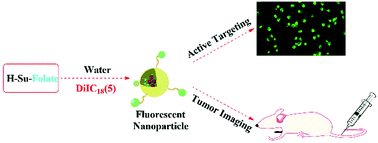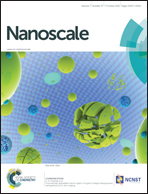An unusual role of folate in the self-assembly of heparin–folate conjugates into nanoparticles†
Abstract
Tumor targeting agents including antibodies, peptides, and small molecules, are often used to improve the delivery efficiency of nanoparticles. Despite numerous studies investigating the abilities of targeting agents to increase the accumulation of nanosized therapeutics within diseased tissues, little attention has been focused on how these ligands can affect the self-assembly of the nanoparticle's modified polymer constituents upon chemical conjugation. Here we present an actively tumor targeted nanoparticle constructed via the self-assembly of a folate modified heparin. Folate conjugation unexpectedly allowed the self-assembly of heparin, where a majority of the folate molecules (>80%) resided inside the core of the nanoparticle. The folate–heparin nanoparticles could also physically encapsulate lipophilic fluorescent dyes, enabling the use of the constructs as activatable fluorescent probes for targeted in vivo tumor imaging.


 Please wait while we load your content...
Please wait while we load your content...